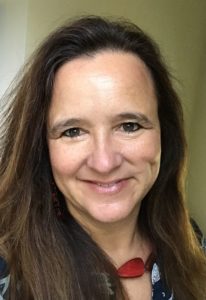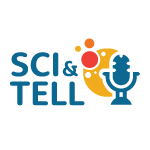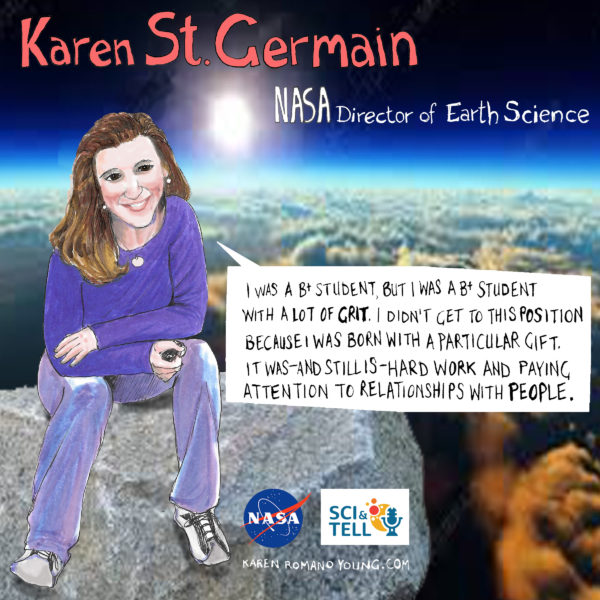Karen St. Germain: From B+ Student to Leader at NASA
04 January 2021

How does one go from being a B+ student who got dressed down by her 8th grade softball coach to the Division Director of the Earth Science Division at NASA? While this might sound like the plot of an inspirational Hallmark movie, this was real life for Karen St. Germain. For our inaugural episode, we talked with her about mentorship, the value of being able to communicate science, and how perseverance can pay off.
This episode was produced by Shane M Hanlon and mixed by Collin Warren. Artwork by Karen Romano Young.
Transcript
Shane M Hanlon: Hi everyone, I'm Shane M Hanlon, the host of the Sci & Tell. Just a note before we get rolling - Each episode is gonna start w/ a quick story from me that somehow relates to something our interviewee said. Sometimes it may seem out of context…but there's definitely a thread there. So w/out further ado, let's get into it.
Shane M Hanlon: I used to jokingly call myself the Abe Lincoln of fellowships. Something that always stuck with me about Lincoln was how many times he ran for elected office…and how many times he lost before finally succeeding. I could definitely relate to that. I applied to about a 1/2 dozen grad schools and only got into one (and frankly, it wasn't my first choice). As a grad student I applied for dozens of grants and fellowships and came away with a handful of small awards. I was waitlisted for the post-phd fellowship that ultimately brought me to Washington, DC. I think (or at least hope) that my current job is the first time that I wasn't the second choice. But instead of being resentful, I've tried to learn from these situations. And at the end of the day - who cares how I got here. I'm being judged on where I'm going, not where I've been.
Shane M Hanlon: Everyone has a story, even, or maybe especially, scientists. Science affects each and every one of us. Let's talk about it. From the American Geophysical Union, I'm Shane M Hanlon, and this is Sci & Tell.
Shane M Hanlon: I am so excited for this. A couple years ago I had this idea to take audio from interviews we were doing with NASA scientists here at AGU and turn them into a podcast, mainly because I just didn't like the idea of unused audio. But during that pilot series where I piggy-backed on our other podcast, Third Pod from the Sun, I realized the folks were talking to were great examples of different folks from different backgrounds in different parts of the sciences. They weren't perpetuating stereotypes of who scientists are and what they look like. They were showing that anyone can be a scientist and that there is no one-size-fits-all formula when thinking about who's in the sciences.
Shane M Hanlon: Well, now we're back for our first official, I guess season. We're going to bring y'all 12 interviews with scientists, mostly from NASA who is the sponsor for this season, who talk about their career path, successes and failures, inspirations, and more.
Shane M Hanlon: For our first episode we talked with Karen St. Germain, Division Director of the Earth Science Division, in the Science Mission Directorate at NASA. That is a long title the basically means Karen does some cool and impressive stuff. So enough from me, let's hear from Karen. Our interviewer was Paul Molin.
Karen St. Germain: My name is Karen St. Germain, and I am the director of Earth Science for NASA. That means I lead the team of scientists, engineers and programs to use the unique vantage point of space to study our home planet and understand how the processes on Earth work.
Karen St. Germain: When I was a little girl, I absolutely loved solving problems. I was really energized by that, solving puzzles and exploring. So, science is really the convergence of those two things. It's understanding how things work, solving problems and, frankly, exploring to find the answers. So, this was a natural endeavor for me.
Karen St. Germain: I have had mentors, and I'll say more broadly, people who believed in me, going all the way back to those junior high days. And then, throughout college and graduate school. I'll give you a couple of examples. When I was in junior high, I was really struggling with algebra. The default response of the system was, "Well, you probably won't use it anyway."
Karen St. Germain: But I had one teacher, and I went to summer school to try to really catch up. I had one teacher who really took an interest. She knew that I was smart, and she knew that it must be just something that I was missing. She focused on helping me figure out what that concept was that I had missed somewhere along the way, and after that, math fell into place for me.
Paul Molin: Have you now, as your career has moved on, been able to kind of reverse that role and mentor young scientists and engineers as they've come up through the ranks, and been able to give back a bit there?
Karen St. Germain: I sure have tried to, and that includes things like going back to my alma matter and talking with students. It includes serving on panels. But closer to home, it includes really challenging the younger people on my team, giving them opportunities to really stretch, to do things that they didn't know they could do, and encouraging them along the way to do that.
Karen St. Germain: Helping them work through problems and challenges because those are the things that were really most valuable to me, that people did for me. You learn more when things aren't going well than you learn when they are going well. So, that's the time when you can really use the additional support.
Karen St. Germain: I would say, over the course of a career, the real hurdle for me has been, and it's not a hurdle, but the real challenge has been knowing when to stick with it, whatever it is, and just keep grinding through, and knowing when it was time to maybe make a change, build a new perspective and a new set of skills, and then trusting that decision was the right one. So, it's not a single major event. It's more a career is built on the collection of everyday individual decisions. So, it's being consistent and being true in those everyday decisions that I think is actually the biggest challenge.
Paul Molin: And from my experience in my field, which is obviously completely different than yours, but a lot of that, being able to look at a problem and switch gears, or to stick with a decision, like you said, a lot of that comes down to confidence and two, having a pretty strong network of people that you can use as a sounding board. Do you find that to be the case?
Karen St. Germain: Yeah, absolutely. And I think that's an important thing for everyone to do. And that means a network that not only consists of people who do what you do, but also people who have very different perspectives. So, I'm very lucky. I've got friends in my life who have been friends for 30 years, and they do very different things than I do, but we do that for each other. We talk one another through those challenges and provide that sort of very blunt feedback that we all need sometimes.
Karen St. Germain: So, I've been very lucky in my life to have mentors and good friends, who've been willing to do that. And as you mentioned earlier, one has to be willing to do that in return, to be that for other people. And so, it's a mutual investment in those relationships. And those people can also help you with the bravery, right? They can help with the encouragement, because sometimes they see things about you that you don't see about yourself.
Paul Molin: I find, in my career, sometimes it's not necessarily that you have to make the right decision all the time. It's like you have to have the confidence to make a decision before you can move forward. And maybe, as you move forward, you find out it was the wrong one, but making a decision can be more of an asset than just hemming and hawing, and being uncertain about how you want to move forward.
Karen St. Germain: That is absolutely true. I often think about my eighth grade softball coach when I think about that kind of situation. So, I had always been an infielder when I played softball as a kid, and I was sort of a utility infielder. But my coach believed, especially at that age, everybody should try every position. You really ought to explore.
Karen St. Germain: So, he put me in the outfield. He put me in center field, and I was lost. And he said, "St. Germain, what are you doing out there? What are you waiting for?" Somebody would hit a ball toward in my general direction that I was responsible for fielding. I'd never get there in time. He walked out, I'll never forget it. Walked out, slow walk, out to center field. He said, "Look, the second you see that batter's bat come off their shoulder," in other words, "The minute you see that they're taking a swing, you start moving."
Karen St. Germain: And I said, "But coach, how do I know where the ball's going to go?" And he said, "It doesn't matter. No matter where the ball goes, you will get there faster if you are moving than you will from a dead stop, if you're standing still, waiting to see where the ball goes."
Karen St. Germain: And I have found that to be true in almost every aspect of life. If you're afraid to move, if you're standing still, waiting to figure out exactly what to do, you're really going to be late to the game.
Karen St. Germain: The fact is, my entire life I was a B+ student, but I was a B+ student with a lot of grit and a great network of friends and family that were just positive influences.
Karen St. Germain: But I didn't get to this position because I was born with a particular gift. I've got a good brain. That's true. But along the way, it was and still is a lot of hard work and paying attention to relationships with people, and paying attention to learning how to communicate. This is the piece of advice I would give to students all the time, is there are two things that are important.
Karen St. Germain: Really paying attention to your own passion, paying attention to what gets you fired up. Because if you're going to excel, you're going to need that passion. So, that's one thing. But the other thing is to take every opportunity to practice communicating with people who don't do what you do. Because that's the other thing that's really going to give you an edge, is if you can be the one who can tell the story.
Shane M Hanlon: My job, when I’m not podcasting, is to teach fellow scientists how to communicate more effectively and I swear I didn’t ask Karen to plug this. But she has a point – if we as scientists don’t get out there to talk about science, someone else will. This is a good thing to keep in mind, especially now, and I wanna thank Karen for sharing her story with us.
Shane M Hanlon: Special thanks to NASA for making this episode possible and to Paul Molin for conducting the interview.
Shane M Hanlon: If you like what you've heard, stay tuned for future episodes. You can subscribe to Sci & Tell wherever you get your podcasts and find us a sciandtell, all spelled out, .org.
Shane M Hanlon: From this scientist in the studio, to all of you out there in the world, thanks for listening to our stories.

